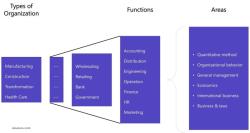What are the duties and responsibilities of a managing director?
The duties and responsibilities of a Managing Director (MD) can vary depending on the organization's size, industry, and structure. However, here's a general overview of the key responsibilities:
Setting Strategic Direction: Developing and implementing the company's strategic plans in alignment with the organization's goals and vision.
Leadership and Decision-Making: Providing strong leadership and making critical decisions that drive the company forward. Guiding and motivating senior management and employees to achieve common objectives.
Financial Management: Overseeing financial performance, including budgeting, forecasting, financial reporting, and ensuring financial stability and growth.
Stakeholder Relations: Managing relationships with stakeholders, including investors, clients, customers, suppliers, and regulatory bodies. Representing the company in negotiations and meetings.
Operational Oversight: Monitoring day-to-day operations to ensure efficiency, effectiveness, and compliance with policies and procedures.
Risk Management: Identifying potential risks to the business and implementing strategies to mitigate them. Assessing market risks, regulatory compliance, and operational risks.
Human Resource Management: Setting the tone for the company culture, overseeing talent acquisition, and ensuring effective human resource management practices are in place.
Innovation and Growth: Encouraging innovation and fostering a culture of continuous improvement within the organization to drive growth and stay competitive.
Public Relations and Branding: Representing the company externally, enhancing its public image, and maintaining a strong brand reputation.
Reporting to Board/Shareholders: Providing regular reports and updates to the board of directors or shareholders on the company's performance, achievements, and challenges.
Legal and Regulatory Compliance: Ensuring the company operates within legal and regulatory frameworks, adhering to laws and standards in the industry.
Strategic Planning and Execution: Developing short-term and long-term plans, initiatives, and goals, and overseeing their execution.
MDs play a critical role in the overall success and direction of the organization. Their responsibilities encompass various aspects of leadership, strategic planning, financial management, and stakeholder relations, with a focus on guiding the company toward growth, profitability, and sustainable success.
What are the primary duties and obligations associated with the role of a managing director?
A managing director (MD) is a senior executive who plays a crucial role in overseeing the overall operations and strategic direction of an organization. They are responsible for leading and motivating teams, making sound financial decisions, and ensuring that the company achieves its goals.
Here are the primary duties and obligations associated with the role of a managing director:
Strategic Leadership:
Develop and Implement Strategic Plans: MDs are responsible for crafting and implementing strategic plans that align with the company's mission, vision, and values. They analyze market trends, assess competitive landscapes, and identify opportunities for growth and expansion.
Set Goals and Objectives: MDs establish clear and measurable goals and objectives for the organization, ensuring that all departments and teams are working towards a common purpose.
Monitor Progress and Make Adjustments: MDs continuously monitor the progress of the organization towards its goals, identifying any deviations or challenges and making necessary adjustments to the strategic plan.
Financial Management:
Oversee Financial Performance: MDs are accountable for the financial performance of the organization. They review financial reports, analyze income statements, and balance sheets, and make decisions to improve profitability and financial stability.
Manage Budgets and Forecasts: MDs oversee the budgeting process, ensuring that resources are allocated effectively to support the organization's strategic goals. They also develop financial forecasts to anticipate future revenue, expenses, and cash flow needs.
Make Investment Decisions: MDs make informed decisions about capital investments, evaluating potential projects, assessing risks and potential returns, and allocating funds to maximize shareholder value.
Team Leadership and Motivation:
Build and Lead High-Performing Teams: MDs cultivate a positive and productive work environment, empowering and motivating employees to achieve their full potential. They foster a culture of collaboration, innovation, and continuous improvement.
Delegate Responsibilities Effectively: MDs delegate tasks and responsibilities to team members based on their skills, expertise, and experience, ensuring that work is distributed efficiently and effectively.
Provide Feedback and Coaching: MDs provide regular feedback to employees, offering guidance, mentorship, and support to help them develop their skills and advance their careers.
External Relations and Representation:
Represent the Company to Stakeholders: MDs serve as the company's spokesperson, representing the organization to external stakeholders, including investors, customers, partners, and the media.
Build and Maintain Relationships: MDs cultivate strong relationships with key stakeholders, fostering trust, collaboration, and mutual understanding.
Manage Public Image: MDs oversee the company's public image, ensuring that its reputation and brand are maintained and enhanced.
Compliance and Ethical Conduct:
Ensure Adherence to Laws and Regulations: MDs are responsible for ensuring that the company complies with all applicable laws, regulations, and ethical standards.
Establish Ethical Guidelines: MDs set forth ethical guidelines for the organization, promoting transparency, accountability, and responsible business practices.
Address Ethical Violations: MDs promptly address any ethical violations or misconduct within the organization, taking appropriate disciplinary action and implementing measures to prevent future occurrences.
Change Management:
Lead Organizational Change Initiatives: MDs effectively manage organizational change initiatives, including mergers, acquisitions, restructuring, and technological advancements.
Communicate Change Effectively: MDs clearly and transparently communicate change initiatives to employees, addressing concerns, providing support, and fostering buy-in.
Minimize Disruption and Ensure Smooth Transitions: MDs implement change management strategies that minimize disruption to the organization's operations and ensure a smooth transition to the new state.
In summary, managing directors play a multifaceted role in leading and managing organizations. They are responsible for developing and implementing strategic plans, overseeing financial performance, building and motivating teams, managing external relations, ensuring compliance, and navigating organizational change. Their ability to make sound decisions, lead effectively, and manage complexity is crucial for the success of the organization.













